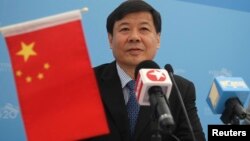Chinese companies with international ambitions are caught in a serious dilemma by the U.S. move to cut corporate tax rates.
The move has made the U.S. an attractive destination for Chinese companies facing very high taxes and other restrictions at home. On the other hand, they face the risk of being punished by Chinese authorities who are opposed to “unnecessary” overseas investments.
Earlier this week, China wrapped up a top-level annual economic policymaking conference, with a three-year pledge to “fight financial risks.” Though there was no specific mention of the U.S. tax reform, it was clear that Chinese authorities are gearing up to counter any external risks to the domestic economy.
Speaking before the conference, Chinese Vice Finance Minister Zhu Guangyao said the fallout of the U.S. tax reform should not be overlooked, but he also added there is no reason to fear because China is planning some initiatives to minimize the impact.
Beijing gave a demonstration of its determination in this area Tuesday as Chinese police broke up an underground bank in Guangdong suspected of involvement in cross-border transactions worth over $70 million in the past month alone.
Chinese companies and wealthy individuals are known to use underground banks to move funds abroad when breaching Beijing’s strict controls on investing in areas the government does not want to encourage.
Chinese investors worry both about official disapproval at home as well as the possibility the Trump administration might take new measures to curb foreign investments in the U.S.
“Now, the question is, of course, how do Chinese investors and Chinese firms view this (U.S. tax move). Maybe, they view this as a great opportunity. Obviously, because corporate taxes are very high in China,” Jacob Kirkegaard, a fellow in the Washington based Peterson Institute of International Economics, said.
“So perhaps they view this as an opportunity and more Chinese firms will then look to invest in the United States but keep in mind that the Trump administration is also at the same time going through a significant, a potentially significant tightening of foreign investment rules, the CFIUS process, which will clearly make it more difficult for many Chinese firms to at least takeover or buy American companies.”
Despite the challenges, China based multinational companies and wealthy individuals cannot ignore the fact that recent moves by the Trump administration are going to change the investment scenario in the U.S. and have some impact in other markets as well.
“I think the bigger concern for China . . . is that it is moving to make U.S. corporations more competitive by lowering the cost. China is aware that it is no longer the low-cost producer anywhere in the world,” said Christopher Balding, associate professor of finance at Peking University’s HSBC Business.
U.S. taxes
The U.S. tax bill holds out an incentive for American companies repatriating profits they have made in operations in foreign countries. China has seen massive investments by U.S. companies, which is why it might be seriously affected if American companies begin to take advantage of this tax offer.
“There is some thinking (in China) that U.S. firms are going to pull their profits out of China and repatriate to the U.S. At least that is the fear, one of the fears in China,” Balding said, “I personally think that is a relatively unfounded fear but it does exist and it is not entirely without rationality.”
Foreign companies generally invest in China because they see it as a proper destination for long term presence.
“With that said, it would not surprise me at all if you see some U.S. corporations trying to get out of China back to the United States. But to be honest, I would be surprised if it was a significant amount,” he said.
The recent increases in interest rates in the U.S. have also raised Beijing’s fears of an intensification of capital flight by wealthy Chinese looking for safe havens for their savings despite a harsh crackdown involving both the Chinese police and financial regulators. The U.S. Federal Reserve has raised interest rates by 0.25 percent three times in 2017 and is expected to do this at least twice next year.
Ultimately, however, it will be a choice Chinese companies are going to have to make. Some see it having little impact.
“Tax is only a small factor affecting business decisions. Just because it moved from 40 percent to 25 percent does not mean that business decisions on where to invest will actually be fundamentally changed,” said Shen Yajie, policy analyst for finance at Beijing based consulting firm, China Policy.







